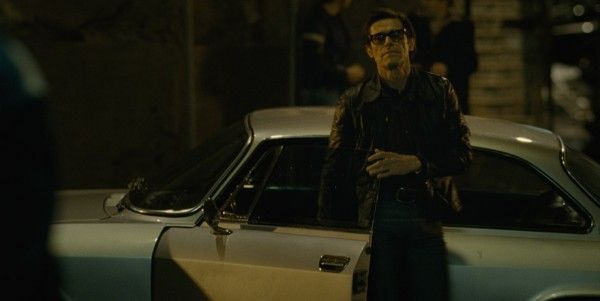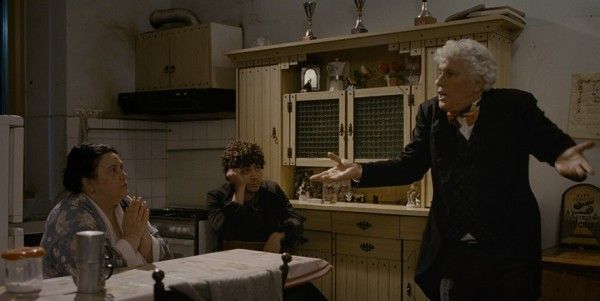Pier Paolo Pasolini was one of cinema’s greatest provocateurs and his mysterious murder is one of film history’s great mysteries. So it only makes sense that Pasolini’s life would attract the attention of a certain Abel Ferrara. The man who made the transition from the grindhouse to the art house with plenty of dirt left under his fingernails has spent a career walking the line between high art and gutter trash. Pasolini offers heaping handsome doses of the former with a little taste of the latter for sting. It’s not Ferrara’s greatest accomplishment, but it’s still another solid piece of work to add to his resume. Hit the jump to find out why.
Rather than trying to fruitlessly condense Pasolini’s entire life into a short running time, Ferrara dials in his attention on the filmmakers last few days. He wakes up to a hug from his mother, wanders through the shared home lined with books, puts a few finishing editorial touches on his gloriously outrageous masterpiece Salo: 120 of Sodom, meets friends, etc. It’s small and real in a way that feels painstakingly researched with a wonderful central performance from Willem Dafoe (who doesn’t attempt an Italian accent to match his costars and that’s for the best). Ferrara also takes the time to shoot one of Pasolini’s unproduced screenplays that he was working on at the time if his death. It’s a strange tale of two bumbling men who stumble into a city comprised exclusively of gay men and lesbians who meet up once a year for an orgy to keep the population alive. Small hints of foreboding danger pop up in an interview with a journalist in which Pasolini rants about everyone being in danger and eventually he ends up beaten to death on a beach under mysterious circumstances.
Compared to Ferrara’s previous movie, the wildly unhinged Welcome To New York that scandalized Cannes, Pasolini is a far more quiet, subdued, and subtle effort. That’s entirely appropriate for Pasolini himself, who by all accounts led a fairly quiet life that didn’t match his wild cinematic fantasies (unlike, say, Ferrara himself). The director shoots the film in a coolly detached manner. It’s entirely observational, peaking in on a life. The only attempts at subjectivity are when Ferrara visualizes Pasolini’s fantasies and unmade feature, which take on the lurid and unhinged nature that both filmmakers are known for. Ferrara’s reverence for Pasolini is clear in every frame. He’s fascinated by this man and want to honor him. It makes for an intriguing movie, but one suited pretty much exclusively for those who already share the director’s love for his subject. There’s no hand-holding or introductions here. It’s a series of deep cuts.
Dafoe is fast becoming Ferrara’s go-to actor and his quietly dignified portrayal of Pasonlini is a perfect example of why. Though more than capable of mugging and wild outbursts (see Spider-man), Dafoe is at his best at his most quiet and complicated. As Pasolini, he seems to be a man filled with secrets and guarded against anyone around him. For an artist who is so free with his wild imagination, it’s a fascinating contrast that clearly appealed to Dafoe and Ferrara. It’s an introspective turn from the actor and a wonderful one, proving that this director/star team has legs to last as long as they can keep the party together. Everyone around him has an easy naturalism, but there’s very little chance for the audience to get to know them. They’re just passersby in the story, more figures to bounce Pasolini’s personality off of than fully fleshed out supporting roles.
If there’s a problem with the movie, it’s that it feels a little too inside. Made in Italy where the deceased filmmaker is revered, Ferrara was playing to a crowd who knew his subject better than 95% of other audiences who will step into the theater. Even those who have done the assigned reading will be faced with an episodic, quiet, and occasionally confounding movie that plays mysteries close to the chest and makes no attempt to welcome anyone in. So, not Ferrara’s best movie, yet far from his worst. It’s as intriguing, alienating, and open to interpretation as any actual Pasolini movie and that was likely the point. For better or worse.
B-
Click here for all of our TIFF 2014 coverage. Click on the links below for our other TIFF 2014 reviews:
- Backcountry
- Cub
- The Drop
- Electric Boogaloo
- Face of an Angel
- Force Majeure
- Foxcatcher
- Haemoo
- The Humbling
- The Imitation Game
- It Follows
- The Look of Silence
- Love & Mercy
- Manglehorn
- Men, Women & Children
- Mr. Turner
- Nightcrawler
- Pawn Sacrifice
- The Reach
- The Riot Club
- Rosewater
- The Tale of Princess Kaguya
- This Is Where I Leave You
- The Wanted 18
- Top Five
- Welcome to Me
- What We Do in the Shadows
- While We’re Young
- Whiplash
- Wild



